Related Research Articles

David Baltimore is an American biologist, university administrator, and 1975 Nobel laureate in Physiology or Medicine. He is a professor of biology at the California Institute of Technology (Caltech), where he served as president from 1997 to 2006. He founded the Whitehead Institute and directed it from 1982 to 1990. In 2008, he served as president of the American Association for the Advancement of Science in 2008.
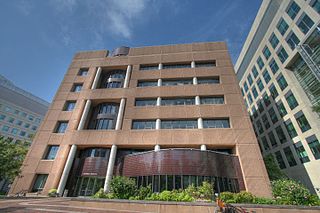
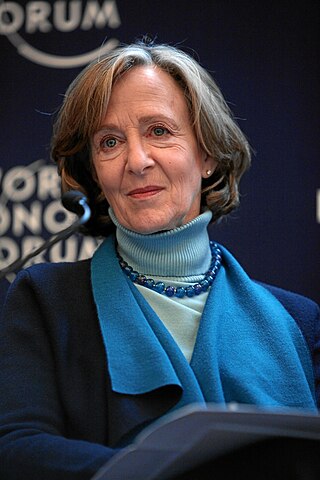
Susan Hockfield is an American neuroscientist who served as the sixteenth president of the Massachusetts Institute of Technology from December 2004 through June 2012. Hockfield succeeded Charles M. Vest and was succeeded by L. Rafael Reif, who had served in her administration as Provost. Hockfield was the first biologist and the first woman to serve as the Institute's president. Hockfield currently serves as a Professor of Neuroscience in MIT's Department of Brain and Cognitive Sciences, a Joint Professor of Work and Organization Studies in MIT’s Sloan School of Management, and a member of the Koch Institute for Integrative Cancer Research. She is also a director of Break Through Cancer, Cajal Neuroscience, Fidelity Non-Profit Management Foundation, Lasker Foundation, Mass General Brigham, Pfizer, Repertoire Immune Medicines, and the Whitehead Institute for Biomedical Research; a lifetime member of the MIT Corporation; and a board member of the Belfer Center at the Harvard Kennedy School of Government. Before returning to MIT following her presidency, Hockfield held the Marie Curie Visiting Professorship at Harvard University's John F. Kennedy School of Government.

Phillip Allen Sharp is an American geneticist and molecular biologist who co-discovered RNA splicing. He shared the 1993 Nobel Prize in Physiology or Medicine with Richard J. Roberts for "the discovery that genes in eukaryotes are not contiguous strings but contain introns, and that the splicing of messenger RNA to delete those introns can occur in different ways, yielding different proteins from the same DNA sequence". He has been selected to receive the 2015 Othmer Gold Medal.

Sir Martin John EvansFLSW is an English biologist who, with Matthew Kaufman, was the first to culture mice embryonic stem cells and cultivate them in a laboratory in 1981. He is also known, along with Mario Capecchi and Oliver Smithies, for his work in the development of the knockout mouse and the related technology of gene targeting, a method of using embryonic stem cells to create specific gene modifications in mice. In 2007, the three shared the Nobel Prize in Physiology or Medicine in recognition of their discovery and contribution to the efforts to develop new treatments for illnesses in humans.

Peter Walter is a German-American molecular biologist and biochemist. He is currently the Director of the Bay Area Institute of Science at Altos Labs and an emeritus professor at the Department of Biochemistry and Biophysics of the University of California, San Francisco (UCSF). He was a Howard Hughes Medical Institute (HHMI) Investigator until 2022.
Sir Michael John Berridge was a British physiologist and biochemist.
Arthur D. Lander an American biologist who is Director of the Center for Complex Biological Systems at the University of California, Irvine.
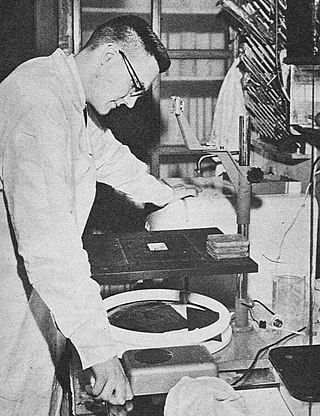
Erkki Ruoslahti is a cancer researcher and distinguished professor at Sanford Burnham Prebys Medical Discovery Institute. He moved from Finland to the United States in 1976.
Timothy "Tim" A. Springer is an immunologist and the Latham Family Professor at Harvard Medical School. He is also a professor at the Department of Biological Chemistry and Molecular Pharmacology and of the Division of Medical Sciences, and a Senior Investigator at the Research Program in Cellular and Molecular Medicine of the Boston Children's Hospital. Springer is best known for discovering the first integrins, LFA-1, and intercellular adhesion molecules (ICAMs), and for elucidating how these cell adhesion molecules function in the immune system. In recent years, Springer's research interest has expanded to malaria, transforming growth factor beta (TGF-β) signaling, and von Willebrand factor.
Brigid L. M. Hogan FRS is a British developmental biologist noted for her contributions to mammalian development, stem cell research and transgenic technology and techniques. She is currently a Professor in the Department of Cell Biology at Duke University, Born in the UK, she became an American citizen in 2000.
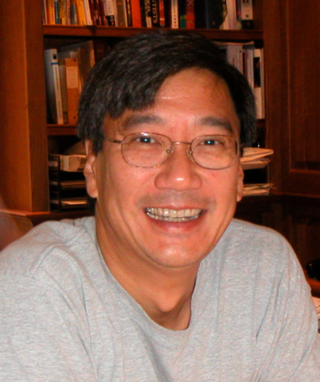
Peter S. Kim is an American scientist. He was president of Merck Research Laboratories (MRL) 2003–2013 and is currently Virginia & D.K. Ludwig Professor of Biochemistry at Stanford University, Institute Scholar at Stanford ChEM-H, and Lead Investigator of the Infectious Disease Initiative at the Chan Zuckerberg Biohub.
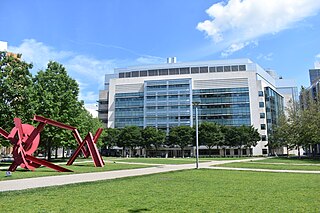
The Koch Institute for Integrative Cancer Research at MIT is a cancer research center affiliated with the Massachusetts Institute of Technology (MIT) located in Cambridge, Massachusetts, United States. The institute is one of seven National Cancer Institute-designated basic laboratory cancer centers in the United States.

Angelika Amon was an Austrian American molecular and cell biologist, and the Kathleen and Curtis Marble Professor in Cancer Research at the Massachusetts Institute of Technology (MIT) in Cambridge, Massachusetts, United States. Amon's research centered on how chromosomes are regulated, duplicated, and partitioned in the cell cycle. Amon was elected to the American Academy of Arts and Sciences in 2017.

Aviv Regev is a computational biologist and systems biologist and Executive Vice President and Head of Genentech Research and Early Development in Genentech/Roche. She is a core member at the Broad Institute of MIT and Harvard and professor at the Department of Biology of the Massachusetts Institute of Technology. Regev is a pioneer of single cell genomics and of computational and systems biology of gene regulatory circuits. She founded and leads the Human Cell Atlas project, together with Sarah Teichmann.
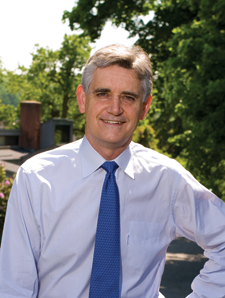
Bruce William Stillman, AO, FAA, FRS is a biochemist and cancer researcher who has served as the Director of Cold Spring Harbor Laboratory (CSHL) since 1994 and President since 2003. He also served as the Director of its NCI-designated Cancer Center for 25 years from 1992 to 2016. During his leadership, CSHL has been ranked as the No. 1 institution in molecular biology and genetics research by Thomson Reuters. Stillman's research focuses on how chromosomes are duplicated in human cells and in yeast Saccharomyces cerevisiae; the mechanisms that ensure accurate inheritance of genetic material from one generation to the next; and how missteps in this process lead to cancer. For his accomplishments, Stillman has received numerous awards, including the Alfred P. Sloan, Jr. Prize in 2004 and the 2010 Louisa Gross Horwitz Prize, both of which he shared with Thomas J. Kelly of Memorial Sloan-Kettering Cancer Center, as well as the 2019 Canada Gairdner International Award for biomedical research, which he shared with John Diffley.
Stephen Joseph Elledge is an American geneticist. He is the current Gregor Mendel Professor of Genetics and of Medicine at the Department of Genetics of Harvard Medical School and in the Division of Genetics of the Brigham and Women's Hospital. His research is focused on the genetic and molecular mechanisms of eukaryotic response to DNA damage, and is known as the discoverer of the DNA damage response (DDR).

Mark Andrew Lemmon an English-born biochemist, is the Alfred Gilman Professor and Department Chair of Pharmacology at Yale University where he also directs the Cancer Biology Institute.
Michael Green was an American molecular biologist and cell biologist at the University of Massachusetts Medical School, where he was the chair of the Department of Molecular, Cell and Cancer Biology, director of the UMass Cancer Center, and a Howard Hughes Medical Institute investigator. Green was a member of the National Academy of Sciences and the National Academy of Medicine.

Kairbaan Hodivala-Dilke, FMedSci is an English cell biologist who has made significant contributions to the understanding of the cellular and molecular biology of the tumour microenvironment and in particular angiogenesis. She is Professor of Angiogenesis and the Tumour Microenvironment and Deputy Institute Director of Barts Cancer Institute, Queen Mary University of London. In 2015 she was awarded the Hooke medal from the British Society for Cell Biology and EMBO membership.
References
- 1 2 "Richard Olding Hynes". American Academy of Arts & Sciences. Archived from the original on 7 April 2023. Retrieved 7 April 2023.
- ↑ "Hynes, Prof. Richard Olding" . Who's Who 2023 . Oxford University Press. 1 December 2021. Retrieved 7 April 2023.
- 1 2 "IOM elects Hynes". Massachusetts Institute of Technology. 25 October 1995. Archived from the original on 7 April 2023. Retrieved 7 April 2023.
- 1 2 "Richard O. Hynes, PhD". Howard Hughes Medical Institute. Retrieved 7 July 2015.
- 1 2 3 "Richard O. Hynes". The Koch Institute. Retrieved 7 July 2015.
- ↑ Cowin, Pamela (2013). "Leaders in Cell Adhesion: An Interview with Richard Hynes, Pioneer of Cell–Matrix Interactions". Cell Communication & Adhesion. 20 (6): 139–146. doi: 10.3109/15419061.2013.857662 . PMID 24274118.
- 1 2 3 4 "RICHARD O. HYNES, PhD, FRS" (PDF). Massachusetts Institute of Technology. Archived from the original (PDF) on 7 April 2023. Retrieved 7 April 2023.
- ↑ "Richard O. Hynes". MIT Biology. Retrieved 7 July 2015.
- ↑ "Professor Richard Hynes FRS". Wellcome Trust. Archived from the original on 8 July 2015. Retrieved 7 July 2015.
- ↑ "Public Policy on Stem Cells". Hynes Lab. Massachusetts Institute of Technology. Retrieved 7 July 2015.
- ↑ "Richard O. Hynes". John Simon Guggenheim Memorial Foundation. Archived from the original on 11 April 2023. Retrieved 11 April 2023.
- ↑ "Richard Hynes". Royal Society. Archived from the original on 11 April 2023. Retrieved 11 April 2023.
- ↑ "Richard O. Hynes, Ph.D., FRS". National Academy of Medicine . Retrieved 15 April 2023.
- ↑ "Richard O. Hynes". National Academy of Sciences . Retrieved 15 April 2023.
- ↑ "Richard O. Hynes". Gairdner Foundation. Archived from the original on 21 October 2021. Retrieved 21 October 2021.
- ↑ "E.B. Wilson Medal". American Society for Cell Biology. Archived from the original on 17 August 2015. Retrieved 4 July 2015.
- 1 2 "Richard O. Hynes, PhD". American Association for Cancer Research. Archived from the original on 10 April 2023. Retrieved 15 April 2023.
- ↑ "Richard Hynes". American Society for Cell Biology. Retrieved 15 April 2023.
- ↑ "An Interview with Richard Hynes David Rall Medal 2017". National Academy of Medicine. Retrieved 15 April 2023.
- ↑ "2022 Albert Lasker Basic Medical Research Award". Lasker Foundation . Retrieved 15 April 2023.